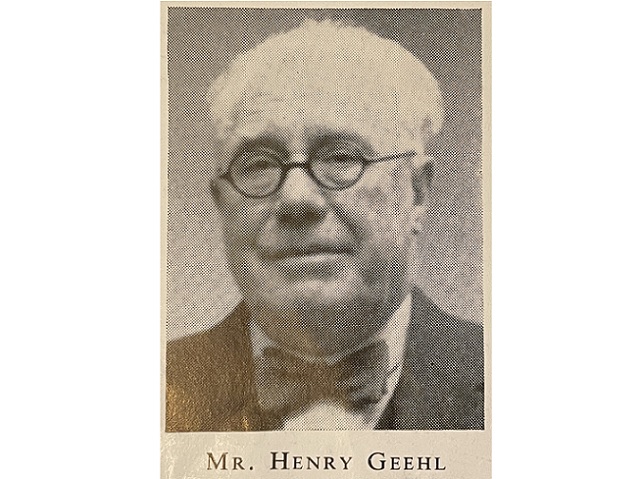
23: Henry Geehl (1881 – 1961)
Henry Geehl’s stature as a significant compositional figure of the 20th century brass band movement has both risen and fallen over time.
A talented pianist, conductor and arranger, he was also prickly, bombastic and boastful.
His complexities have ensured that some 60 years or more following his death, he remains curiously enigmatic; his musical reputation based on a series of works occasionally revived in popularity, his personal reputation forever tempered by his claims on others.
Youthful talent
Henry Ernest Geehl (pronounced Gale) was born in London on 28th September 1881. One of five children, his father, John Henry was a German immigrant, his mother, Matilda from Shoreditch.
His youthful talent was nurtured via a scholarship at the age of 14 to the Guildhall School of Music under Austrian pianist Benno Schönberger (1863-1930) and Orlando Morgan (1865-1956), and later with Anton Schliebner in Vienna.
Morgan’s influence was marked. Both enjoyed long academic tenures; Morgan at the Guildhall School of Music, and Geehl at Trinity College. However, they were also to find lasting critical acclamation of their work difficult to achieve.
Morgan’s influence was marked. Both enjoyed long academic tenures; Morgan at the Guildhall School of Music, and Geehl at Trinity College. However, they were also to find lasting critical acclamation of their work difficult to achieve.
Morgan’s reputation was forever tainted by negative reviews and hints of plagiarism associated with the last Savoy Opera, ‘Two Merry Monarchs’. The Times pronounced that although he “had a gift for facile melody”, the composer, “falls below the level of accomplishment one might have reasonably expected.”
Geehl, who also had a keen ear for compositional familiarity was also to face the same critical appraisal time and again.
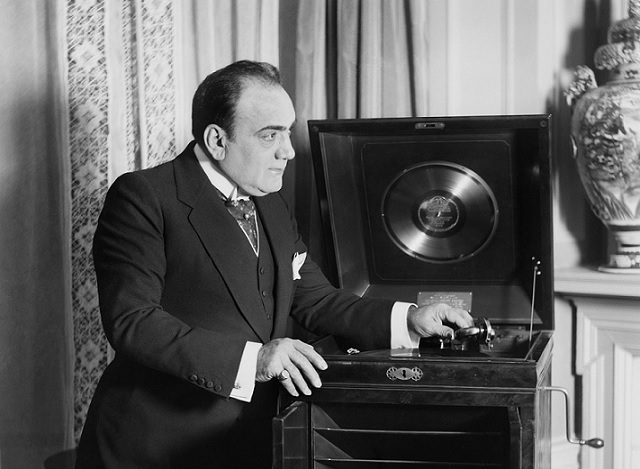
The great Enrico Caruso the star performer of Geehl's song 'For You Alone'
Caruso
A career as a touring concert pianist never fully materialised (unlike Morgan’s other pupils such as Dame Myra Hess). In 1908 he returned to London to conduct secondary operatic companies.
In 1910 his popular song ‘For You Alone’ was recorded by the great Italian tenor Caruso (although it wasn’t his first ‘English’ recording as Geehl liked to claim). In 1959, Geoffrey Whitham (euphonium) recorded it with Black Dyke Mills Band, although it was never commercially released.
Geehl later became a music editor of R. Smith & Co as well as Edwin Ashdown, and on leaving the Army in 1919 he joined the staff at Trinity College of Music - remaining there until his death in 1961.
Avuncular
It was at Trinity College that Geehl’s disappointment at a lack of wider recognition was shown in aspects of his personality.
An avuncular appearance (not unlike the famous 1940s Labour politician and trade unionist Ernest Bevin) did not hide his loquacious inclination for boastful embellishment.
An avuncular appearance (not unlike the famous 1940s Labour politician and trade unionist Ernest Bevin) did not hide his loquacious inclination for boastful embellishment.
A former student, the composer and critic William Lovelock, said that although they found him, “a genial teacher who told many interesting stories”, he was inclined, “to brag about his achievements and relations with famous musicians of the day.”
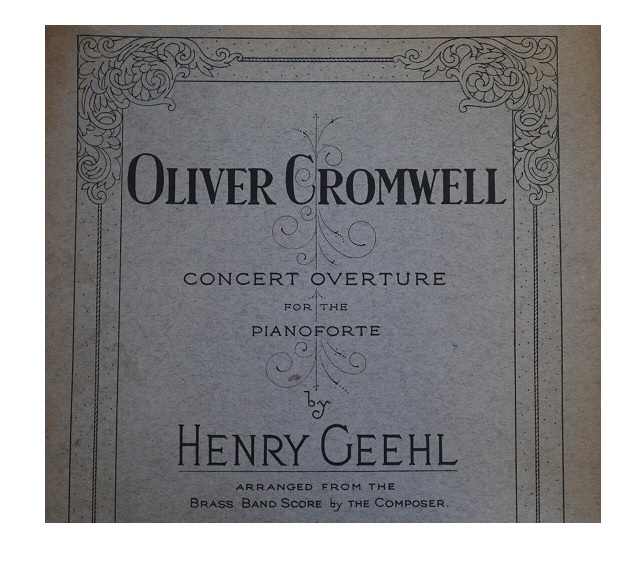
Oliver Cromwell
He was not an insidious liar, but was capable of hiding the truth – as shown when in 1923 his ‘new work’, the concert overture, ‘Oliver Cromwell’ was chosen as the test-piece for the National Championship of Great Britain.
The composer was also asked to adjudicate, but like the questioning of provenance that arose over his involvement in Elgar’s ‘Severn Suite’, it later transpired that the work was perhaps not the, “…original composition of the modern school expressly written for the National Band Festival” as stated in the programme.
At some time between 1902 and 1922 the Band of the Coldstream Guards seemingly recorded it on a 78rpm in a wind ensemble arrangement.
Perhaps Geehl, keen to protect his new found acclaim, did not wish to spoil the assumption of its originality - and certainly not its warts and all...
Warts and all
However, according to Paul Hindmarsh in referencing it in research some years later, it was still a much more ‘thoroughbred’ work than others of the time - making “strenuous demands on stamina” and exploiting “a range of dynamics and organ-like textures”.
Perhaps Geehl, keen to protect his new found acclaim, did not wish to spoil the assumption of its originality - and certainly not its warts and all...
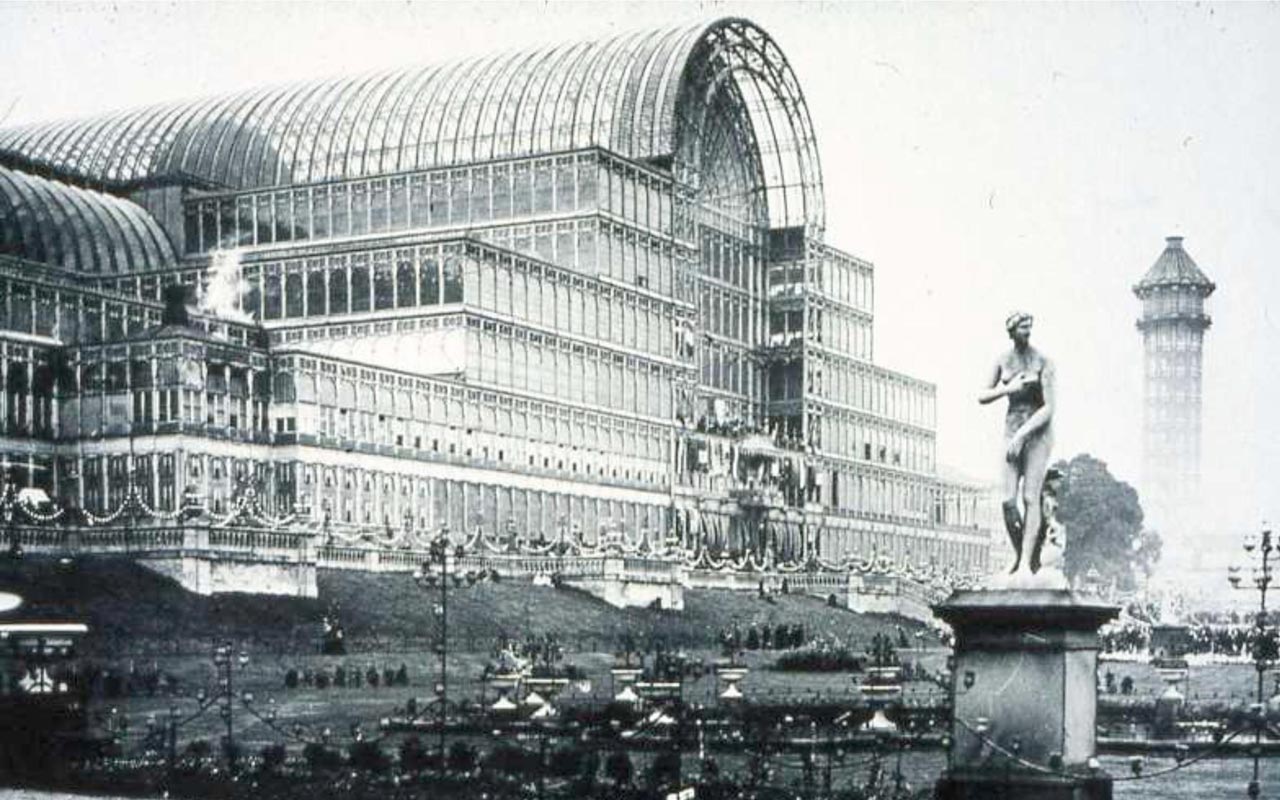
The Crystal Palace - home to the National Championships
No such questions
No such questions arose over his next work – the rhapsody for brass band, ‘On the Cornish Coast’, which was used in 1924 at the National contest (Geehl was once again in the box) and which was accompanied by a short precis by Herbert Whiteley.
H Gordon Tidey, writing in the British Bandsman shortly after the event, described it as “a veritable triumph of really clever brass band writing”, although the format (which comprised five short pen portraits – including one according to the write-up which was called ‘Helston Furry Dance’) was already a dated concept.
H Gordon Tidey, writing in the British Bandsman shortly after the event, described it as “a veritable triumph of really clever brass band writing”,
It perhaps explains why his only other major test-piece to make any sort of lasting mark was ‘Scena Sinfonica’ written for the 1952 September Belle Vue ‘Open’. He called it “a dramatic Opera Scena” requiring “freedom… both in tempi and expression, so that various emotions, suggested by the music, may be reasonably portrayed.”
It certainly retained a sense of invention, although it was last performed at a contest at Second Section level in 1989.
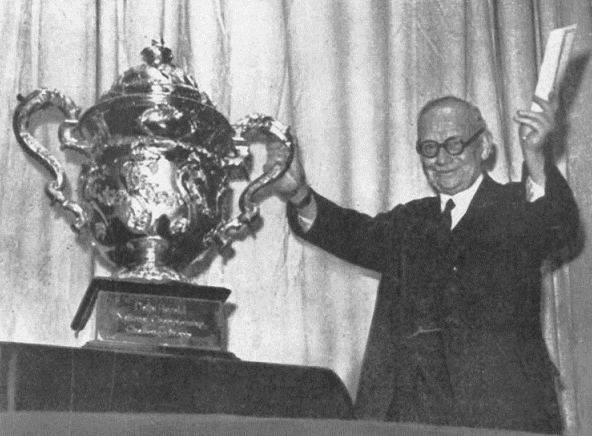
Geehl wrote 'Threnody' in memory of the great Fred Mortimer
Erased in time
His other works though have almost been erased in performance time.
The rather insipid overture ‘Robin Hood’ was used at the 1936 and 1941 (as a choice of three) British Open, whilst the symphonic ode ‘Normandy’ (composed for the 1945 National Championship Gala Concert and quoting the famous ‘V for victory’ as well as heartfelt ‘Elegy’ written to commemorate his son who was lost in the conflict) soon faded away.
However, it was his inferences that he had considerable input into the scoring of some of the iconic works of banding’s ‘Golden Era’ that has seen his reputation suffer under scrutiny.
‘Sinfonietta Pastorale’, ‘Thames Valley Suite’ and others have also faded into obscurity, bound together in an unimaginative straitjacket of conservative familiarity and repetitiveness. Only his touching ‘Threnody’ in memory of Fred Mortimer has retained a timeless relevance.
Reputation
However, it was his inferences that he had considerable input into the scoring of some of the iconic works of banding’s ‘Golden Era’ that has seen his reputation suffer under scrutiny.
Just when he first started to publicly seek credit for his involvement with Elgar’s ‘Severn Suite’ is open to question, although in an article for ‘The Conductor’ magazine in April 1960 titled, ‘The Unrecognised Arranger’, the catalyst was ignited.
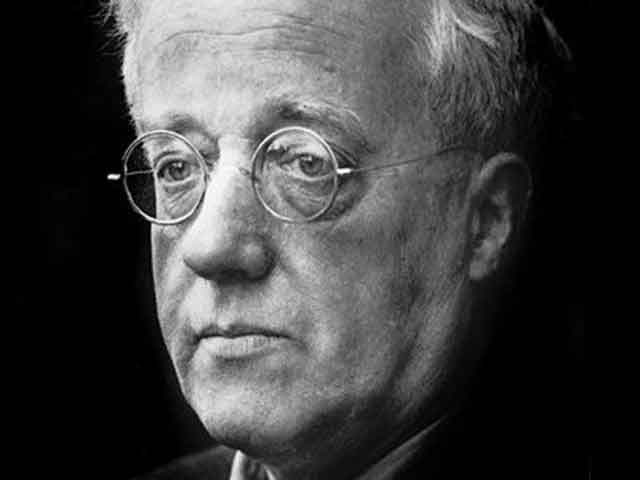
Gustav Holst
Moorside Suite
In it, Geehl revealed that he had earlier been consulted by Gustav Holst to work on his ‘A Moorside Suite’ (1928).
“Holst (in addition to Elgar but not Ireland) was another composer who proved very difficult,” he wrote.
“I visited him several times in connection with ‘A Moorside Suite’ and, when he asked my opinion about a bit of the scoring he was working on, I ventured to remark that I thought the passage in question needed more filling in – the middle especially – and mentioned a similar part in Tchaikovsky’s ‘Romeo and Juliet’.”
Circussy
He added: “At this innocent remark he flew into a temper, telling me that Tchaikovsky’s music was banal, his scoring “circussy” and his craftsmanship beneath contempt!
Such presumption rather nettled me, and I suppose I was somewhat rude when I told him, ‘that it did not interest me one little bit what he thought of Tchaikovsky, but it would interest me greatly to know what Tchaikovsky thought of him!’"
Such presumption rather nettled me, and I suppose I was somewhat rude when I told him, ‘that it did not interest me one little bit what he thought of Tchaikovsky, but it would interest me greatly to know what Tchaikovsky thought of him!’
He concluded his tale saying: "I am sorry to say that we did not part the best of friends – and I never met him again.”
Holst died in 1934, so was not around 26 years later to contradict his rather bombastic account.
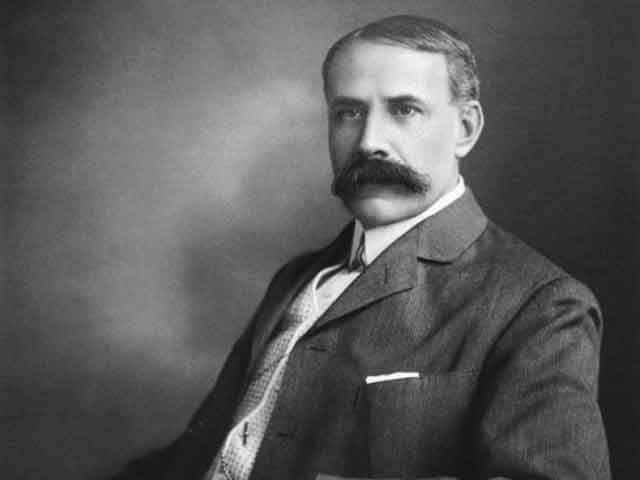
Edward Elgar
Embellished
Geehl certainly embellished his involvement in Elgar’s ‘The Severn Suite’ - although for decades his account also seemed plausible given the lack of any in depth research into the matter at the time.
According to him: “I was in continuous consultation with the composer, who provided me with a very sketchy piano part with figured bass and a kind of skeleton orchestral score, mostly in two or three parts, with an indication of the sort of counterpoint he desired me to add; the rest of the score he left to my discretion.”
Not easy to work with
With more than a touch of sub-conscious irony, Geehl suggested that Elgar was not an easy man to work with (true in many ways) and having many preconceived ideas on scoring which he tried very hard to get him to adopt.
With more than a touch of sub-conscious irony, Geehl suggested that Elgar was not an easy man to work with (true in many ways) and having many preconceived ideas on scoring which he tried very hard to get him to adopt.
Geehl wrote: “It took a great deal of argument on my part to convince him that his ideas were just not possible. I remember particularly a ‘bad’ afternoon when I endeavoured to persuade him to omit the mutes in the Minuet, well knowing that the sound would be entirely different from what he imagined. But all to no purpose!”
Elgar also died in 1934. No contradictory account was to become available until Robert Kay wrote an extensive article for the journal of the Elgar Society in December 2013.
Music and myth
Kay was the proprietor of Acuta Music, publishers of the music from Elgar’s last years.
In ‘The Severn Suite: Manuscript, Music and Myths’, he refers to letters from Herbert Whiteley to Elgar dated January and February 1930, which make it clear that he was initially expecting Elgar to send him a short score, rather than an orchestrated full score, of the work.
Kay’s forensic research went on to show that there was no evidence that a short score was ever sent to R. Smith and Co. and, at some point, Elgar decided to bypass Geehl and do the scoring himself.
No evidence
As Kay explained: “The plan was for this short score to be handed to an expert in brass - band scoring who would then do the work of orchestration. R. Smith and Co. had recently published competition test pieces by the brass band expert Henry Geehl and it was intended that Geehl would create a brass band full score from Elgar’s short score manuscript.”
Kay’s forensic research went on to show that there was no evidence that a short score was ever sent to R. Smith and Co. and, at some point, Elgar decided to bypass Geehl and do the scoring himself.
Conclusive proof
It was the conclusive proof many had thought was the truth of the matter all along.
Geehl did however go on to arrange ‘Severn Suite’ for wind band, adding his own descriptive sub-titles to each of the movements, but his involvement in the original composition was negligible at best.
It now seems a rather sad way in which to remember Geehl and his contribution to the brass band movement.
Piqued
He was not a composer of the rank of Holst, Ireland or Elgar, and perhaps his ego was piqued that in relation to them he was seen as a rather subsidiary figure. The stories of his romanticised tales recalled by former students bear that out.
However, as Eric Ball, writing in British Bandsman after Geehl’s death in 1961 said: “It should not be forgotten that a number of the most famous original brass band works by celebrated composers were scored by him.”
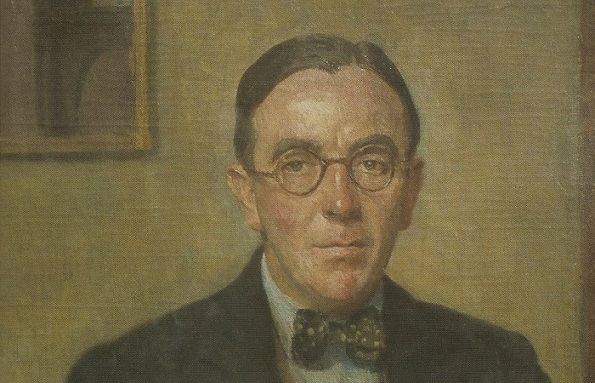
John Ireland
Geehl probably had an association in the two later works from John Ireland - ‘A Downland Suite’ and ‘Comedy Overture’ as well as with Herbert Howells’s ‘Pageantry’ for the 1934 Belle Vue contest.
He later wrote, “With my dear friend John Ireland, both in his ‘A Downland Suite’ and ‘Comedy Overture’ which he afterwards, at my suggestion, scored for orchestra, entitled ‘A London Overture’, I worked always ‘con amore’.
He candidly agreed that he knew nothing about brass bands, and my many suggestions – even to form and modulation – were readily adopted.”
Ireland died in 1962 but had long taken himself away embittered, isolated and withdrawn from the musical mainstream.
Different truth
The truth of that, as with most of what Geehl recalled, may be somewhat different, although the contract Herbert Howells signed with R. Smith and Co, clearly stated that the publisher had the right to make a brass band arrangement of ‘Pageantry’ - implying that the original rested in some form of piano score or sketches.
He died in Beaconsfield on 14th January 1961 – a musician possessed of substantial talent, unfulfilled ambition and romanticised self-aggrandisement.
Despite the obvious caveats that now surround him, Geehl’s contribution to the brass band movement as a composer, arranger, adjudicator and teacher remains significant.
As do his other achievements: He scored two major films, made numerous arrangements and recordings with the celebrated singer Richard Tauber, recorded works by Elgar, Handel and Mozart and wrote a symphony, concertos for piano and violin.
He died in Beaconsfield on 14th January 1961 – a musician possessed of substantial talent, unfulfilled ambition and romanticised self-aggrandisement.
And forever an enigma.
Tim Mutum
4BR Hall of Fame: No.1: Jack Atherton
https://www.4barsrest.com/articles/2019/1832.asp
4BR Hall of Fame: No.2: Albert Baile
https://www.4barsrest.com/articles/2019/1836.asp
4BR Hall of Fame: No.3: Stanley Boddington
https://www.4barsrest.com/articles/2019/1842.asp
4BR Hall of Fame: No.4: Bram Gay
https://www.4barsrest.com/articles/2020/1848.asp
4BR Hall of Fame: No.5: Leonard Lamb
https://www.4barsrest.com/articles/2020/1855.asp
4BR Hall of Fame: No.6: Arthur Stender
https://www.4barsrest.com/articles/2020/1866.asp
4BR Hall of Fame: No.7: Violet Brand
https://www.4barsrest.com/articles/2020/1871.asp
4BR Hall of Fame: No.8: Eric Bravington
https://www.4barsrest.com/articles/2020/1875.asp
4BR Hall of Fame: No.9: Norman Ashcroft
https://www.4barsrest.com/articles/2020/1879.asp
4BR Hall of Fame: No.10: Albert Chappell
https://www.4barsrest.com/articles/2020/1884.asp
4BR Hall of Fame: No.11: Betty Anderson
https://www.4barsrest.com/articles/2020/1889.asp
4BR Hall of Fame: No.12: Trevor Walmsley DFC
https://www.4barsrest.com/articles/2020/1897.asp
4BR Hall of Fame: No.13: Percy Code
https://www.4barsrest.com/articles/2020/1903.asp
4BR Hall of Fame: No.14: George Thompson MBE
https://www.4barsrest.com/articles/2020/1909.asp
4BR Hall of Fame: No.15: Willie Lang
https://www.4barsrest.com/articles/2020/1914.asp
4BR Hall of Fame: No.16: James Scott
https://www.4barsrest.com/articles/2021/1916.asp
4BR Hall of Fame: No.17: Jack Mackintosh
https://www.4barsrest.com/articles/2021/1922.asp
4BR Hall of Fame: No.18: Teddy Gray
https://www.4barsrest.com/articles/2021/1928.asp
4BR Hall of Fame: No.19: Rowland Jones
https://www.4barsrest.com/articles/2021/1932.asp
4BR Hall of Fame: No.20: Helen Perkin
https://www.4barsrest.com/articles/2021/1944.asp
4BR Hall of Fame: No.21: Lt Col Cecil H Jaeger OBE
https://www.4barsrest.com/articles/2021/1954.asp
4BR Hall of Fame: No.22: Alex Mortimer
https://www.4barsrest.com/articles/2021/1966.asp













